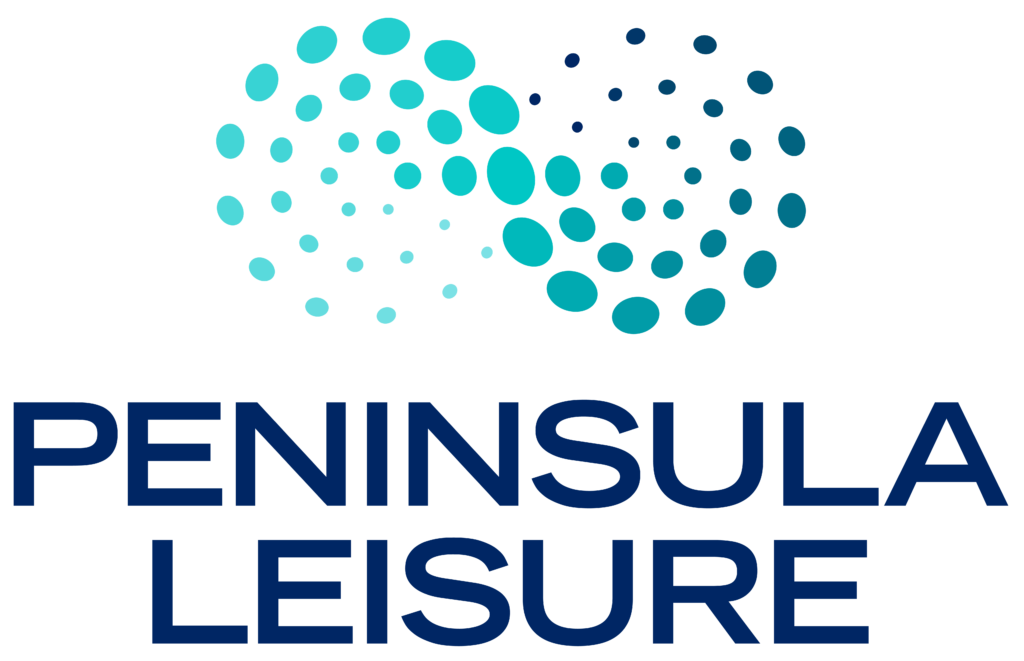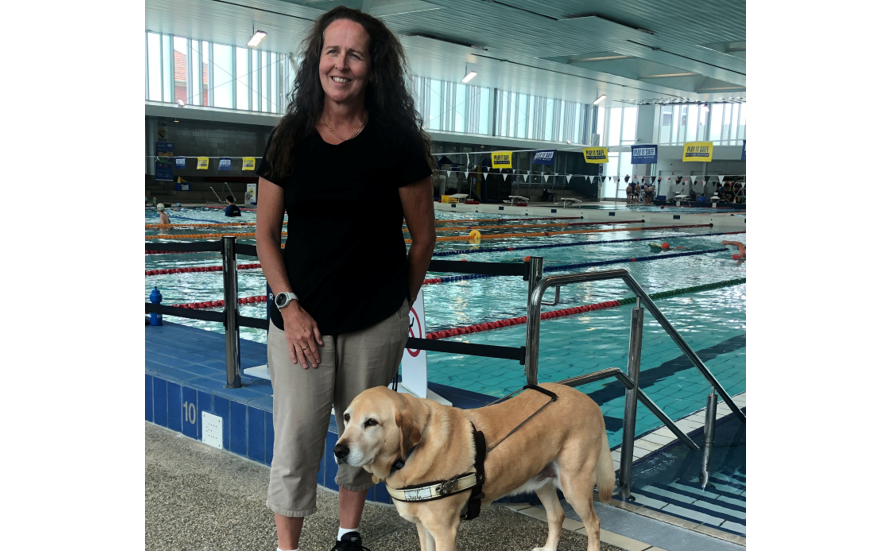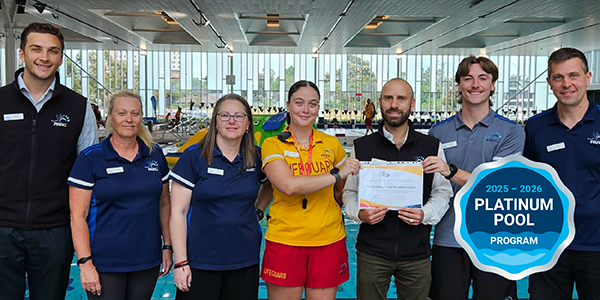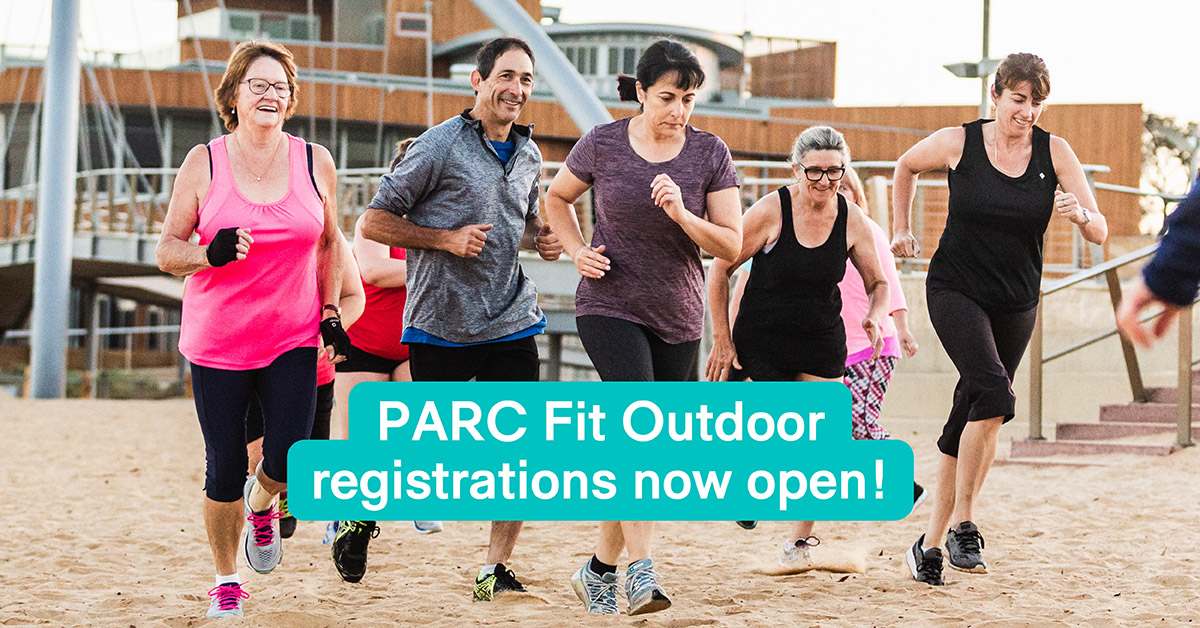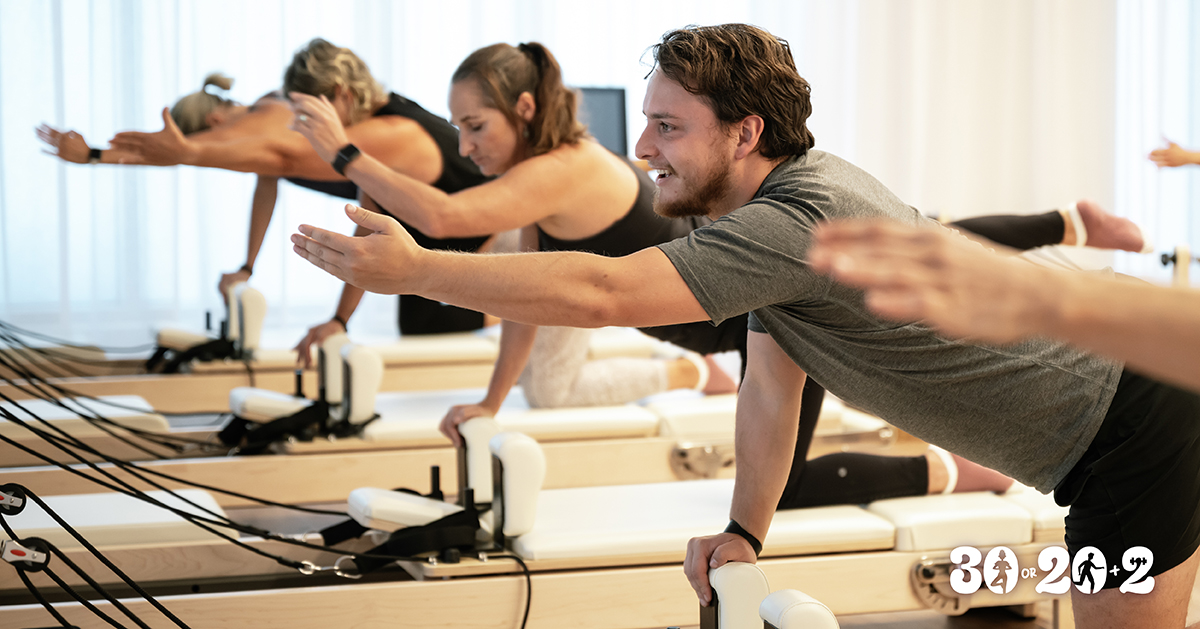On Sunday we celebrate International Women’s Day, a day of unity, reflection, advocacy and action.
At PARC we are lucky enough to be surrounded by some pretty incredible women. We want to share their stories so we’re doing a series of interviews with Inspiring Women of PARC.
Our Marketing Specialist Jess de Araugo caught up with one of our inspiring members, Maree Heenan.
Maree has been a member with us for a little under a year. She attends the pool at least twice a week with her Deafblind Communication Guide Ainslie and her Guide Dog Sancho. Maree is deafblind which means she has combined vision/hearing impairment, but that doesn’t stop her coming in each and every week to do her exercise, get fit and be social and active. Next time you’re not sure if you can be bothered getting down for a swim, think of Maree, Ainslie and Sancho for inspiration.
Let’s meet our inspiring member Maree:
Tell us a bit about yourself.
Hi, I’m Maree. I am 52, married, with 2 lovely adult daughters, and I am deafblind. I have a condition called Usher Syndrome. It is characterised by partial or total hearing loss, and loss of vision caused by “RP” or retinitis pigmentosa. For me it causes me to see black spots or patches. I can hear some high-pitched sounds like the pedestrian crossing, or the sound your credit card makes when you tap a payment.
Prior to having children, I did work, for large companies like BHP, but after I had raised my daughters, my vision was too poor and finding work was too difficult.
I absolutely love sport. Being active is the number one thing to me, it makes me feel strong, safe and good about myself.
What was your dream job as a child and why?
I always wanted to be an athlete. If I had perfect vision, I would have been a leading tennis player like Ash Barty.
What is it like to be deafblind?
The word for my condition is called Usher Syndrome. When I was younger my vision was ok, I used to be able to see a little further, but as I aged it deteriorated. I see black dots, and over time, those dots have gotten bigger.
I also got a Cochlear Implant 33 years ago. Hearing aids never helped me. I have some hearing in one ear, and I can hear some things. For example, when my daughters have a shower and they play music really loudly, and I can hear the music. I guess it never occurred to me that my eyes would deteriorate too.
How do you communicate with others?
I use Auslan (Australian Sign Language) to communicate. I have a Deafblind Communication Guide, Ainslie. I sign to Ainslie, and then when she signs back to me I touch her hands to feel what she is signing, this is “tactile” sign. When I am signing to others Ainslie interprets my signing into voice.
As I can see some things, people can write in big black texta and I can read that with glasses. I can also read things in big font on my phone, and my husband recently found this great new App on my phone called Live Translation which means people can talk and it converts it to be block text that I can then read.
My husband Joseph also has Usher Syndrome, so we both have hearing and vision impairments. We can communicate really effectively, and we have an amazing relationship, we are a perfect match.
How did you meet your husband?
I already had a Cochlear Implant and Joseph and his parents were looking to meet and talk to someone about their experience because Joseph was a candidate to also receive one. Through contacts from having the surgery myself, Joseph and I were introduced and met at the Eye and Ear Hospital so that I could share my experience. Joseph then later tracked me down and found me at my work, and invited me out to lunch. Joseph had his Cochlear Implant put in around 2 years later.
When we met, we did not know we both had Usher Syndrome, we were both diagnosed later and found out that our hearing and vision impairments were very similar.
Joseph and I have been together 31 years and have 2 beautiful daughters. We feel so lucky and happy that both our daughters have perfect hearing and sight!
Neither of us have a car so we have to get public transport or rely on a Support Worker. It’s just wonderful when we get to go on outings together in a car, a drive to somewhere new!
What’s the biggest misconception about people who are deafblind?
People are generally unsure about how to approach me. They get confused, as they see Sancho my guide dog, but don’t realise I also can’t hear, and sometimes they just think I am being rude and ignoring them.
Tell us about your relationship with Sancho.
Sancho is my companion, my guide dog. He is with me full time and has been for the last 8 years. Before Sancho I did have another guide dog, but he needed to retire due to arthritis in his leg.
Sancho is 9 and a half years old now, but he’s still strong and he’s very good. I feel very lucky to have such a good guide and I really hope he will continue with me for a long time. I do feel a little bit concerned that I wouldn’t find another one as good as him.
What are your favourite activities?
I love being active. I love all sports – biking, gym, walking outside. Last year Ainslie and I did the 1,000 Steps. I used to walk up and down Oliver’s Hill steps, but now that’s too dangerous for me. I just like to be strong and feel good. I am 52 now so I don’t want to stop!
What do you do at PARC?
I come to PARC twice a week to swim. I only started coming last year as prior to this I didn’t have the funding and I can’t come without my Communication Guide. With additional support from NDIS I was able to get more support hours so that’s when I started coming to PARC.
I have been waiting for 30 years to come and exercise regularly, and I am finally able to come. It really is a dream come true. More support hours means more regular swimming, and for me, that really is life-changing. I love it. I feel so much better in my life now that I can come and swim.
Tell us you feel in the water.
I feel safe. When I am walking around, I might trip on something or bump into someone, but in the water, I feel confident and safe.
It’s also so good for my body. When you sign a lot and use a guide dog and also sometimes a cane your arms can become strained. I always had pain in my arms, but now with the swimming, the pain has gone – it’s been so wonderful.
People are always amazed that I can swim so well when I come in here.
On hard days, what motivates you to get up and get active?
I just have to. I just have to do it. Just jump in and swim.
Sometimes I feel like everyone also, when you can’t be bothered, but you just have to go. I enjoy being active in the morning, I feel strong first thing.
Plus, swimming stops the stress for me. It’s extremely good for my body and for my mind.
The theme for International Women’s Day this year is #EachforEqual – What does that mean to you?
Each person can access life – everyone has an opportunity to access life and be part of life in the same way.
What woman inspires you and why?
My mum always encouraged me and told me I could do anything, you can do everything the same that everyone else can.
By meeting with Maree, and seeing how she and her Communication Guide Ainslie interact, I was lucky enough to witness incredible bravery and great trust too. I absolutely find Maree inspirational. Thank you, Maree, Ainslie and Sancho, the three of you were the highlight of my week!

